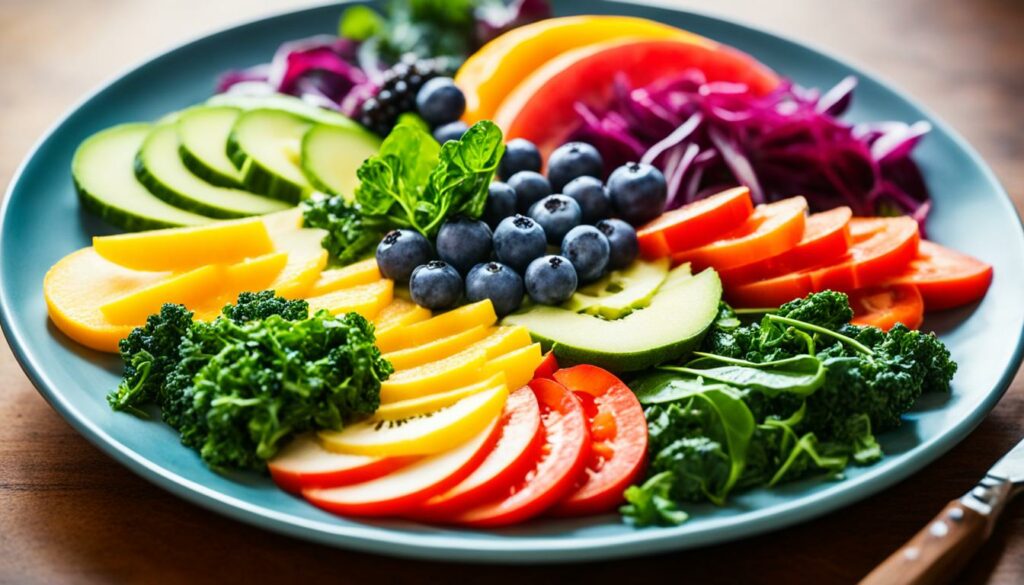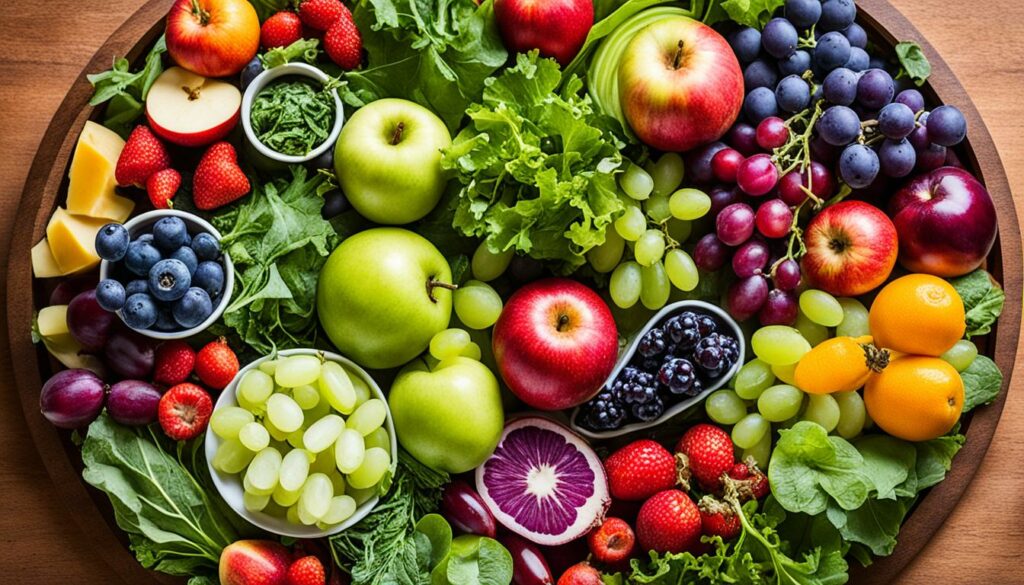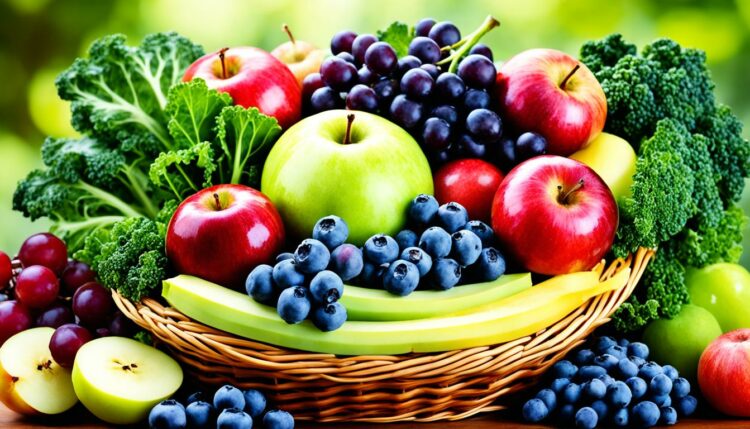Did you know that the average dietary intake of quercetin in the United States is estimated to be only 6-18 milligrams per day? This powerful antioxidant is found in many fruits and vegetables and offers numerous health benefits.
But consuming several servings of quercetin-rich foods can significantly increase your intake, leading to a healthier you.
Key Takeaways:
- Quercetin is a powerful antioxidant found in many fruits and vegetables.
- Dietary intake of quercetin in the U.S. is estimated to be around 6-18 milligrams per day.
- Consuming several servings of quercetin-rich foods can significantly increase your quercetin intake.
- Some of the best quercetin sources include onions, kale, cherry tomatoes, broccoli, blueberries, and apples.
- Quercetin can also be obtained from red wine, black tea, and green tea.
What is Quercetin?
Quercetin is a phytochemical, polyphenol, and flavonoid that acts as a powerful antioxidant. It is a pigment found in the skins and leaves of many fruits and vegetables, adding vibrant colors to these plant-based foods.
As a flavonoid, quercetin is part of a group of compounds that have been studied for their potential health benefits. Its antioxidant properties help protect cells and DNA from damage caused by free radicals.
Quercetin belongs to a larger group of phytochemicals, which are natural compounds produced by plants. These phytochemicals, including quercetin, have been associated with positive effects on human health.
Additionally, quercetin is considered a polyphenol, a type of compound known for its antioxidant and anti-inflammatory properties.
In the United States, the average dietary consumption of quercetin is estimated to be around 6-18 milligrams per day. However, individuals who consume multiple servings of fruits and vegetables likely consume higher amounts of this beneficial compound.
Health Benefits of Quercetin
Quercetin offers several health benefits. Research has shown that it supports heart health by lowering blood pressure and cholesterol levels, as well as relaxing blood vessels.
It can also improve men’s sexual health by improving blood flow. In terms of brain health, quercetin may reduce inflammation, protect brain cells from toxins, and lower the risk of degenerative diseases like Alzheimer’s.
Anti-cancer effects have also been observed, with studies showing that quercetin can slow tumor growth, lower the risk of lung cancer, and have the ability to attack leukemia cells. These health benefits make quercetin an important compound to include in a healthy diet.

Quercetin is a powerful antioxidant that offers numerous health benefits. It supports heart health by lowering blood pressure and cholesterol levels and relaxes blood vessels, improving overall cardiovascular function.
Additionally, quercetin has been found to have positive effects on brain health. It reduces inflammation, protects brain cells from toxins, and lowers the risk of degenerative diseases like Alzheimer’s.
The anti-cancer effects of quercetin are also noteworthy. Studies have shown that it can slow tumor growth, lower the risk of lung cancer, and even exhibit anticancer properties against leukemia cells. Incorporating quercetin-rich foods into your diet can help you harness these health benefits and support your overall well-being.
Quercetin Food Sources
While quercetin is present in many foods, there are specific sources that are particularly high in this antioxidant compound. Including these quercetin-rich foods in your diet can significantly boost your intake of this beneficial compound.
Onions
Onions, especially red and yellow varieties, contain quercetin, with the highest amounts found in the skins and outer layers.
Kale
Kale, a nutritional powerhouse, is another excellent source of quercetin, along with other beneficial compounds like vitamins A and C.
Cherry Tomatoes
Cherry tomatoes, particularly when consumed with the skin, provide a good amount of quercetin.
Broccoli
Broccoli is rich in quercetin as well as vitamin K and vitamin C.
Blueberries
Blueberries are antioxidant superstars and contain multiple phytochemicals, including quercetin.
Apples
Apples, especially eaten with the peel, offer quercetin along with other phytochemicals and fiber.
| Foods | Quercetin Content (mg per 100g) |
|---|---|
| Onions | 19.7 |
| Kale | 17 |
| Cherry Tomatoes | 9.8 |
| Broccoli | 6.4 |
| Blueberries | 3.1 |
| Apples | 1.7 |
By incorporating these quercetin-rich foods into your daily meals, you can enjoy the health benefits of this powerful antioxidant compound.
Other Quercetin Sources
In addition to obtaining quercetin from whole foods, it is also available as a supplement. Quercetin supplements are commonly recommended at a dose of 500-1,000 mg per day.
However, it is important to note that these supplements may interact with certain medications, and high doses (over one gram) may have a negative impact on kidney health.
Quercetin can also be obtained from other sources, including red wine, black tea, and green tea. Red wine contains quercetin, but it is important to consume it in moderation. Black and green tea are also good sources of quercetin and offer additional health benefits as well.

Benefits of Quercetin Supplements
Quercetin supplements provide a convenient way to increase your intake of this powerful antioxidant. Here are some of the potential benefits of quercetin supplements:
- Antioxidant Protection: Quercetin helps neutralize free radicals, reducing oxidative stress and protecting cells from damage.
- Heart Health: Quercetin may support heart health by reducing inflammation, improving blood flow, and lowering blood pressure and cholesterol levels.
- Immune Boost: Quercetin has immune-enhancing properties and may help support a healthy immune system.
- Allergy Relief: Quercetin’s anti-inflammatory properties may help reduce symptoms of allergies, such as nasal congestion and itching.
- Exercise Performance: Some research suggests that quercetin supplements may help improve exercise performance and reduce exercise-induced inflammation.
“Quercetin supplements provide a convenient way to increase your intake of this powerful antioxidant.”
Other Sources of Quercetin
In addition to supplements, there are other natural sources of quercetin that you can include in your diet:
| Source | Quercetin Content |
|---|---|
| Red Wine | Contains quercetin, but consume in moderation |
| Black Tea | A cup of black tea contains approximately 2-10 mg of quercetin |
| Green Tea | A cup of green tea contains approximately 2-5 mg of quercetin |
Adding these quercetin-rich beverages to your daily routine can provide an additional boost of this beneficial compound. Whether you choose to get your quercetin from supplements or natural sources, it’s important to be mindful of the recommended dosage and any potential interactions with medications.
Considerations and Precautions
When considering quercetin supplementation, it is important to be aware of the recommended dosage, which is typically between 500 and 1,000 mg per day. However, it is always advisable to consult with a healthcare professional before starting any new supplement regimen.
Quercetin supplements are generally considered safe to use, but they may interact with certain medications, including antibiotics and blood thinners.
It is also important to note that high doses of quercetin (over one gram) may have negative effects on kidney health. Monitoring interactions and adhering to recommended dosages is essential when considering supplementation.
Additionally, it is important to remember that obtaining quercetin from whole foods offers additional benefits, such as fiber, that are lacking in supplement form.
| Considerations and Precautions when using Quercetin Supplements | |
|---|---|
| Recommended Dosage | Between 500 and 1,000 mg per day |
| Consultation | Always consult with a healthcare professional before starting any new supplement regimen |
| Interactions | Quercetin supplements may interact with certain medications, including antibiotics and blood thinners |
| High Doses | High doses of quercetin (over one gram) may have negative effects on kidney health |
| Whole Food Benefits | Obtaining quercetin from whole foods provides additional benefits like fiber |
Conclusion
Incorporating quercetin-rich foods into your diet can have numerous benefits for your health. This powerful antioxidant supports heart health, brain health, and may even help reduce the risk of cancer.
While the average daily intake of quercetin in the U.S. is relatively low, consuming multiple servings of fruits and vegetables can significantly increase your intake of this beneficial compound.
Supplementation may be an option for individuals who want to ensure they are getting optimal levels of quercetin. However, it is crucial to consider the recommended dosage and potential interactions with medications.
Additionally, obtaining quercetin from whole foods offers the added benefits of essential nutrients and fiber, which are lacking in supplement form.
By incorporating quercetin-rich foods into your diet and considering supplementation with caution, you can support your overall health and well-being. Achieving optimal levels of quercetin through a well-rounded diet will not only provide important health benefits but also contribute to your overall optimal health.
FAQ
What are the top quercetin foods for a healthy diet?
Some of the best quercetin food sources include onions, kale, cherry tomatoes, broccoli, blueberries, and apples.
What is quercetin?
Quercetin is a phytochemical, polyphenol, and flavonoid that acts as a powerful antioxidant.
What are the health benefits of quercetin?
Quercetin supports heart health, brain health, and has anti-cancer effects.
Which foods are high in quercetin?
Quercetin is found in onions, kale, cherry tomatoes, broccoli, blueberries, and apples.
Are there other sources of quercetin besides food?
Quercetin can also be obtained from supplements, as well as red wine, black tea, and green tea.
What should I consider when taking quercetin supplements?
It is important to follow the recommended dosage, be aware of potential side effects, and consider interactions with medications.
In conclusion, what are the benefits of a quercetin-rich diet?
Including quercetin-rich foods in your diet can provide numerous health benefits, supporting optimal health.




